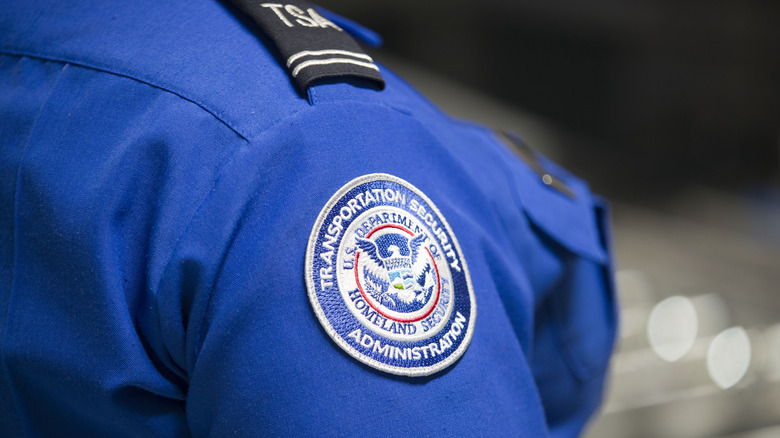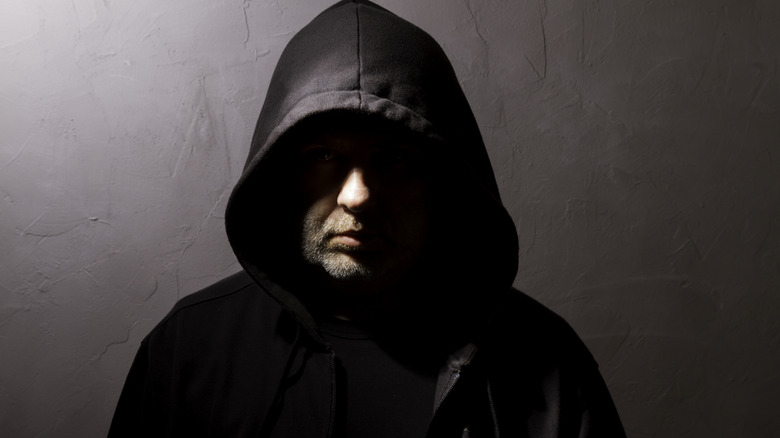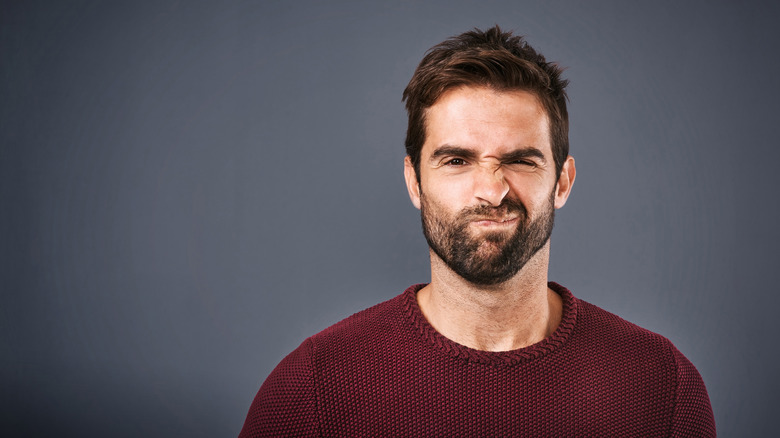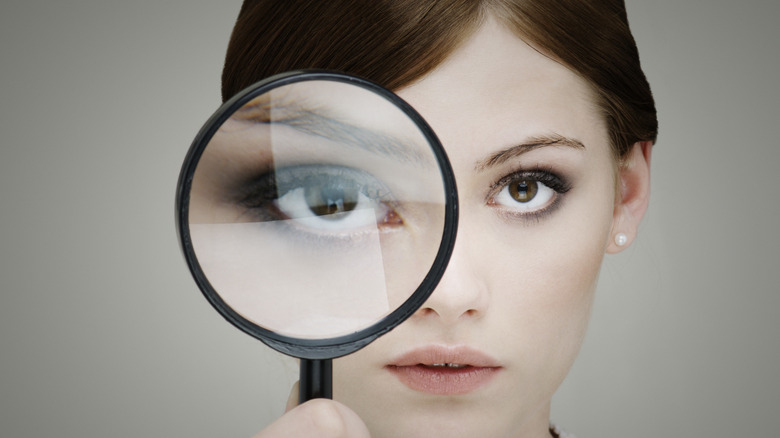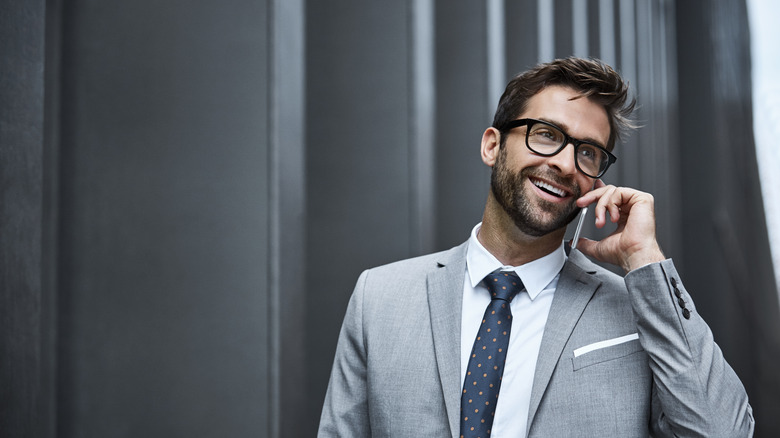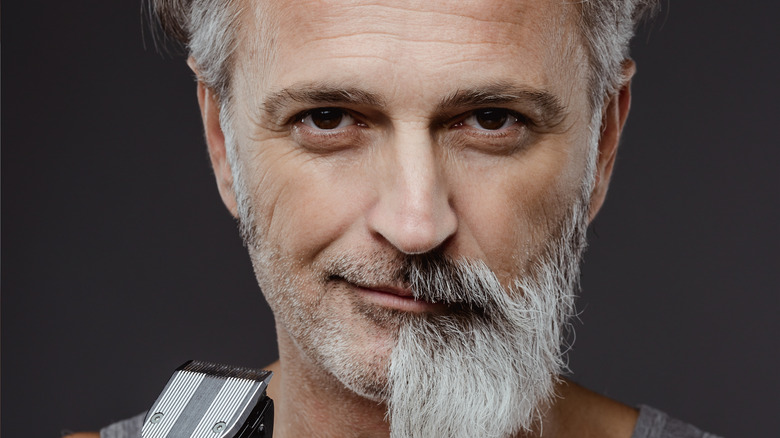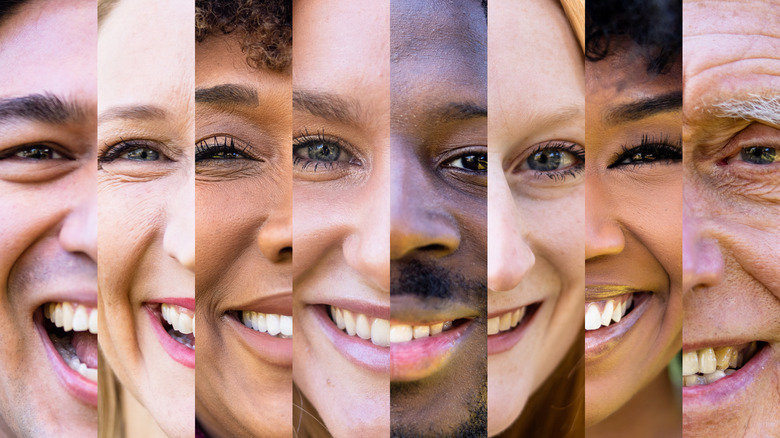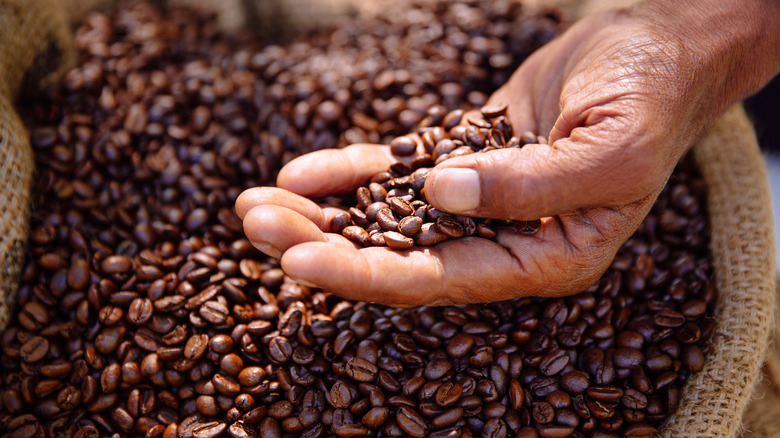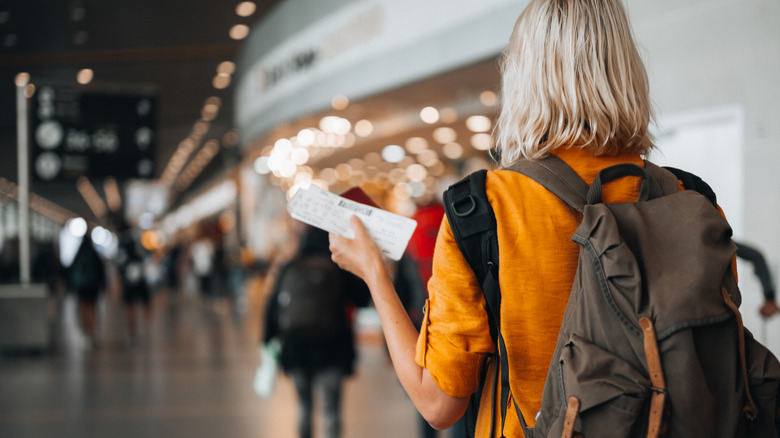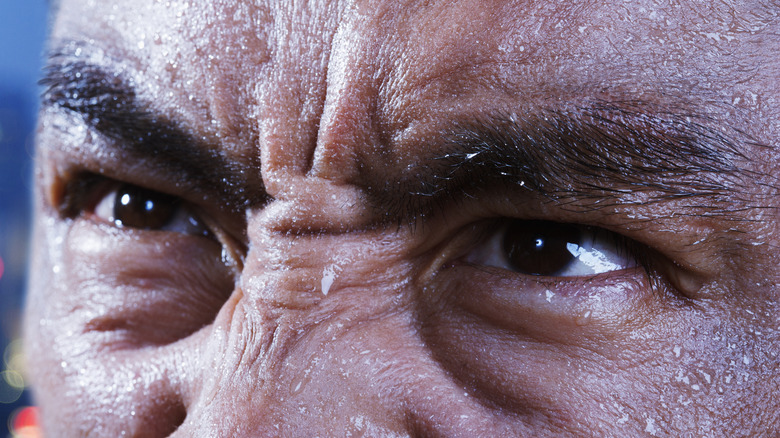Everything TSA Agents Immediately Notice About You
Every frequent traveler will be well versed in the routine interactions that take place in an airport. From the check-in and bag drop desk — which travelers like Rick Steves suggest skipping altogether by packing light — to the boarding procedures, there's a natural flow to the airport experience. One major hurdle that travelers must navigate is the TSA checkpoint. Instituted in the wake of 9/11, TSA has become the primary line of defense that protects air travelers from threats in the sky.
This doesn't make the journey through security any easier on routine flyers. Unloading electronic devices from the bag, taking off jackets, shoes, and belts, and removing liquids can be a minor nuisance on your voyage to exciting places. Compounding the time demand, sometimes TSA agents will single out passengers for additional screening or notice a questionable lump in scanned bags, adding to the contact you might have with these security officers. It might seem random (and certainly inconvenient), but there is actually a set of underlying principles that guide much of the TSA personnel's work. If you're selected for added scrutiny, there may actually be a good reason for the interest. TSA agents are trained to spot numerous little details about the people they interact with. Everything from your facial expressions to the clothes you're wearing goes into the decision to ask more questions or simply send you through. These are the things TSA staff notice about you as you snake your way through the security line and beyond.
Your clothing can signal potential subversion
One of the most obvious signals you send to TSA agents begins with your clothing choice. TSA agents are trained to look for baggy clothing, and they are especially wary of stylistic choices that seem to contradict the prevailing weather conditions. It's natural to want to wear comfortable clothing while flying, especially on long, international travel itineraries. However, clothing that leaves plenty of room between its exterior layers and your body can create an excellent hiding place to stash something you might not want the security check to uncover. Therefore, TSA agents are particularly interested in anyone wearing baggy clothing. They will be more likely to pull you aside for additional screening if you wear a large hoodie or any other clothing that stands out.
This may be particularly troubling for those who have adopted this strategy of overdressing for a flight in order to bring more stuff along for the ride. With the increased cost of checking on luggage and even bringing carry-on baggage that was once standard, many people are opting to wear their heaviest items on the plane rather than packing them. Just be aware that if you're wearing jeans and a heavy jacket on a flight out of Florida in June, you may be in for increased scrutiny and more than a few stares as you encounter the TSA line.
Your demeanor says a lot, as well
What you're wearing isn't the only thing security personnel will notice. Aggressive passengers, for one, stand out like a sore thumb. Most people shuffle their way through the security line and meander across the airport halls to reach their gate without much emotion at all. Anyone exhibiting behaviors that stray from the norm will, therefore, attract attention from both other passengers and the TSA staff, who are professionally trained to watch for such things. Nervousness, aggressive behavior, extreme sadness, and sometimes even the jittery body language that comes with anxiety over a tight layover window can lead TSA agents to focus their gaze on you.
Anything that's out of the ordinary becomes something that TSA agents fixate on in order to stop any potential threats to other passengers, airline staff, and infrastructure. Your demeanor provides a window into the mind hiding inside. Only you know your true intentions and thoughts, and while most passengers won't be looking to hijack a plane or harm others, a deep scar that prompted the creation of TSA in the first place acts as a constant reminder that these kinds of threats continue to exist in the background. If your behavior is out of the ordinary, expect TSA agents to pay more attention to you.
They look for your eyes
Those who are nervous or have something to hide sometimes divert their gaze away from figures of authority and others. This is a common body language behavior for those who aren't confident or are looking to remain undetected. It's the same strategy children use to avoid being called on in class, even though it often doesn't work.
As such, TSA agents are specifically looking into the eyes of the people they come into contact with. Shakespeare and others have said that the eyes are a window into the soul, and by gazing into your eyes, a TSA agent will be trying to gauge whether you are someone with nefarious intent or simply a traveler on their way to someplace new. For most people, a diverted gaze won't factor substantially into their encounter at the security line. However, it's a powerful psychological tool that law enforcement personnel lean on to make important decisions about people on a regular basis. It's hard to remain totally calm when you're up to no good, and one of the first telltale signs that others will notice when you're trying to hide something rests in your eyes.
They listen to what you say
Talkative people often engage with TSA agents for longer than they like. Having an outgoing personality and routinely making conversation with the people you encounter isn't typically a negative trait, but it can factor into your exchange with TSA agents in a meaningful way. Another common behavior trait of people trying to hide something is over-talking. Rambling on about this or that tends to be something that people do when they are trying to shift focus away from another aspect of their person. Any number of small details can be missed by the untrained eye when distracting behaviors are taking place in the background. Perhaps it's an expiration date on a driver's license or even a nervous energy regarding the weight of a traveler's carry-on bag that makes someone engage in this practice. Nefarious actors are also often guilty of speaking too much. A smuggler might look to confound a security agent with rapid discussion on the weather, sports, or any other topic that might allow them a brief opening to slip by undetected.
TSA agents are trained to deal with these kinds of distractions. They will listen to what you say to determine if there is any important and actionable information coming out of your mouth. But their focus will remain on your documents and belongings throughout the interaction. It goes without saying, but aggressive talk or jokes about guns, bombs, or other weapons won't go over well with TSA agents either.
They watch intently to see what phone users may be up to
Security areas in airports often include signage that prohibits the use of phones. This may include the entire space or just the area in which you'll interact with TSA agents. Usually, nothing will be said to someone on their phone unless it poses a genuine distraction or other issue. Cell phones have become ubiquitous in modern life, and many travelers rely primarily on their mobile devices for entertainment while on the move. However, no matter how normal it might seem to see someone talking on the phone, it's actually a potential distraction tool while maneuvering through a security line. For one thing, a nervous individual looking to hide something might stare at their phone as a means to distract themselves from revealing whatever that sensitive information might be.
A phone conversation is yet another way to create a small scene that might offer the conditions necessary to throw off a TSA agent's keen sense of sensory interrogation and to draw attention away from something else. Much like talking directly to security staff and diverting a gaze, talking on the phone can be used as a similar tool to try to escape thorough security checks. Therefore, TSA agents are very interested in people who are talking on the phone and the conversations they are having, specifically.
TSA agents are interested in your hair style, and signs of recent changes
Hairstyles can offer more hints about who you are and where you've been than you might anticipate. How you style your hair can offer a few baseline clues that formulate a larger picture. More importantly, TSA staff will be on the hunt for two specific features. Men and women with long hair would be better off wearing it down when traveling through a TSA line. Even though tying up your hair might be more comfortable on a long journey, this choice often yields more scrutiny in the security area. This is because the clips or pins you might use to tie up your hair can set off scanners and metal detectors. Hair that's intricately styled can also potentially serve as a hiding place for something that a traveler doesn't want to share with security staff. This makes hairstyle a key feature that TSA agents search for in every traveler walking through an airport's security line.
Another stylistic feature that agents are on the hunt for is less about the hair that's there and more concerned with what has disappeared. Women who have recently cut their hair short and men who have just shaved their beards may exhibit a unique and highly visible tan line across their faces and necks. Drastic changes like this will pique the interest of TSA agents who may be curious to learn more about your decision to make such a significant appearance change.
Contrary to stated practices, they often take note of ethnicity and race
While racial profiling is a practice that law enforcement and other security personnel claim to no longer deploy (TSA claims it "does not tolerate racial profiling"), anecdotal and direct evidence point to the contrary when it comes to airport security. Both TSA agents' personal investigatory tools and the technology airports use to screen passengers exhibit engrained biases that discriminate against racial and religious minority groups. The ACLU and The New York Times have both reported (in 2017 and 2012, respectively) that TSA agents themselves admit to racial profiling in their screening tasks and Vox and ProPublica (both in 2019) detailed specifics on how scanning equipment unfairly targets people of color.
TSA has also introduced a specialized set of undercover officers disguised, perhaps ironically, in the same TSA uniforms that regular agents wear. The Atlantic (in 2009) has noted that these agents specifically target minorities regularly for follow-up questions and added security checks. Behavior Detection Officers (BDOs) can often be seen roaming around the departure hall or standing near gates, seemingly on a break. What they are really doing is observing passengers who assume that they have completed the security check portion of their journey. BDOs are searching for anything out of the ordinary, seeking to add an extra layer of security to the travel experience, but this comes at the expense of people of color while often failing to produce this increased threshold of safety.
They'll often flag coffee bean carriers
Anyone traveling from Central or South America, Southeast Asia, or parts of Africa will almost assuredly sample the fantastic coffee these regions produce. Drinking a freshly brewed cup of Joe directly from the source is a uniquely enriching experience, and many will want to bring some of that magic home. But traveling with coffee beans won't just give you a great cup of java upon your return; it may add an extra layer of interest for security officers when you transit through the airport on your way home. Whether in the customs line at your first stopover in America or when you mosey through security on your way to a connecting flight, coffee beans may provide the impetus for an extra stop and a question or two.
For many, it may come as a surprise, but it turns out that coffee beans sometimes double as a tool used by smugglers. Seeking to throw off sniffer dogs as they bring illicit goods through the airport, large quantities of coffee beans may be employed to add a strong alternative odor to the baggage containing illicit goods. Most travelers aren't likely to be thoroughly searched due to packing a bag of beans in their suitcase, but the potential for a comprehensive line of questioning and baggage search is certainly in the cards. This is especially true for those prominently carrying coffee beans, perhaps in a backpack's outward-facing mesh pouch that's visible without opening any compartments.
They scour boarding passes for the dreaded 'SSSS' marker
One feature that many travelers will already know about is the dreaded black mark on their printed boarding pass. If you see "SSSS" printed anywhere on your ticket, you'll need to prepare for extra screening as a rule rather than an exception. These four S's stand for "Secondary Security Screening Selection" and are often displayed prominently in bold lettering in the center or corner of your ticket. While it's not something a TSA agent will notice as you shuffle through the security line, it stands out like a sore thumb when presenting your ID and boarding pass for inspection. Airlines are allowed to flag passengers for this extra screening, and all manner of reasons could be behind the addition of these four time-adding characters to your ticket. Personally, I've seen them show up on my boarding passes on a few occasions, but the security process wasn't dramatically different than under typical circumstances in any instance, so it shouldn't come as an anxiety-inducing discovery to find them on your travel documents.
The code can be assigned to travelers who have booked a one-way ticket or made their reservation at the last minute. It may also be applied to those flying to a country deemed a heightened risk by the State Department. It's also randomly applied to passengers as a means of deterrence for those who might think they can slip through the cracks by engaging in carefully curated behaviors.
They're on the hunt for compulsive yawners
Yawning is yet another sign of nervousness that TSA agents are trained to watch out for. Of course, a traveler yawning before boarding a very early or late-night flight won't typically stand out. Likewise, a yawn or two at any time of the day isn't necessarily all that suspicious, considering that the physical act is done as a way to suck in additional air (increasing alertness, specifically). The physical stressors of carrying around heavy luggage or rushing to get to a gate can have anyone needing a small pick-me-up, especially as they reach a line that allows them a temporary reprieve from this physical toll.
However, excessive yawning often acts as a sign of nervousness rather than one associated with someone simply catching their right. Therefore, TSA agents will almost certainly spot this unusual behavior when it presents itself. If you find yourself yawning compulsively while standing in the security line, don't be surprised if you are pulled aside for additional questioning or have your person or bag checked over a little more thoroughly than usual when you arrive at the scanners.
Sweating, whistling, and repetitive grooming gestures get noticed
Lastly, there are a variety of behaviors that TSA personnel have deemed specifically suspicious, adding them to something called the TSA SPOT list. While it's unknown publicly how many behaviors must be identified in an individual in order to raise true suspicion, there are many signals on this terrorist and criminal identification tool that are part of the public discourse. Things like sweating and whistling will be immediately picked up on by TSA agents scouring a security line for potential threats. Whistling is a behavior that people engage in when trying to tamp down nervous energy, and the sound it creates is easily spotted by anyone with a pair of ears. Similarly, excessive sweating isn't an ordinary occurrence inside the well-air-conditioned space of an airport. If you arrive at the ID checkpoint and are sweating profusely, you should expect to receive a few extra questions about what's going on in your life.
Finally, excessive grooming gestures can be a telltale sign that you are trying to hide something. A person who constantly brushes their hair back or plays with their face in some way or another will quickly gain the attention of TSA agents. Cop shows and other features of pop culture have made the public keenly aware of the fact that people who are nervous often touch their faces in some way or another, and TSA agents will pick up on this cue with ease in real life, too.
